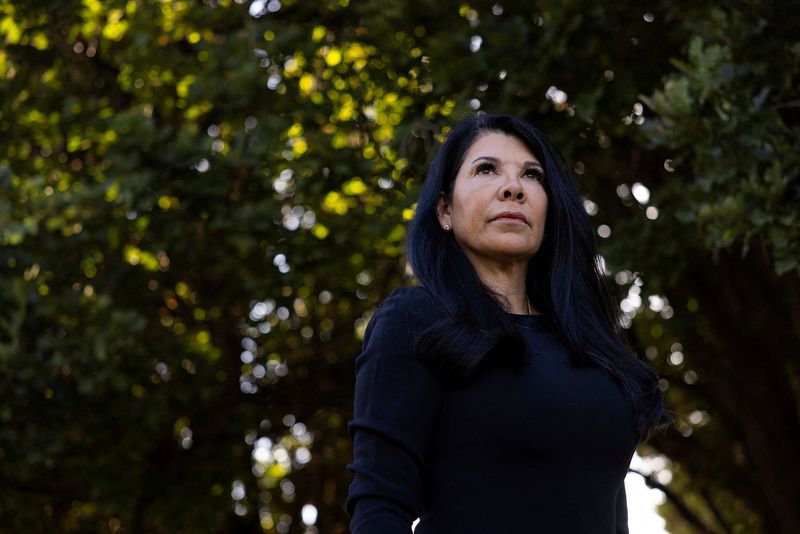By Laura Gottesdiener and Michael Martina
WASHINGTON (Reuters) -A bunch of households whose family members died of fentanyl overdoses filed a petition with the workplace of U.S. Commerce Consultant Katherine Tai on Thursday, requesting a probe into China’s alleged function in fueling the U.S. artificial opioid disaster.
The petition was filed below Part 301 of the Commerce Act of 1974, a statute that enables the U.S. to impose sanctions on international international locations that violate commerce agreements or harm U.S. commerce. The households are searching for commerce countermeasures that embrace tariffs of a minimum of $50 billion on Chinese language merchandise.
China is the world’s main chemical producer. The petition alleges that China’s authorities has didn’t crack down on exports of precursors utilized by traffickers to fabricate illicit fentanyl, inaction that has value the U.S. trillions of {dollars} in misplaced productiveness, greater well being care prices, elevated regulation enforcement spending, and lack of life because of deadly overdoses from the artificial drug.
A 2022 evaluation by the congressional Joint Financial Committee estimated that the opioid disaster value the U.S. practically $1.5 trillion in 2020.
Overdoses from artificial opioids killed practically 75,000 individuals within the U.S. final yr alone and are approaching a half-million fatalities over the previous decade, authorities figures present.
Part 301 empowers the US Commerce Consultant (USTR) to research and defend the U.S. in opposition to international commerce practices, together with motion that “burdens or restricts” U.S. commerce. Any particular person can file a petition, and USTR should resolve inside 45 days whether or not to provoke a probe.
A USTR spokesperson stated the company is reviewing the petition.
Nazak Nikakhtar, an lawyer on the Wiley Rein regulation agency who filed the petition on behalf of the households, advised Reuters the difficulty was “squarely” inside USTR’s authorized authority given the debilitating results of fentanyl habit on the American workforce and the U.S. economic system.
“China responds to economic pressure. We’re going to put economic pressure on China,” stated Nikakhtar, a former Commerce Division official.
China’s embassy in Washington didn’t reply instantly to a request for remark.
Reuters investigations this yr have revealed that Chinese language chemical corporations brazenly promote fentanyl-making substances on the web and ship them to the U.S. with ease, thanks, partially, to an obscure U.S. commerce regulation, generally known as de minimis, which permits low-value packages to enter the U.S. obligation free and with minimal paperwork and inspections.
The petition recommends a wide range of commerce countermeasures, together with imposing tariffs of a minimum of $50 billion on Chinese language items and companies, and banning Chinese language shipments from getting into the U.S. by way of de minimis.
Andrea Thomas, one of many plaintiffs on the petition, stated she hoped the commerce motion would save lives by forcing China to cease exporting fentanyl precursor chemical substances.
“There’s been so much devastation to our families,” stated Thomas, whose daughter died in 2018 after taking a fentanyl-laced tablet she thought was a painkiller.
China says it has among the strictest drug legal guidelines on the earth, and that the U.S. must curb narcotics demand at house.
The petition comes simply weeks forward of the U.S. presidential election, the place fentanyl has emerged as a key difficulty.
Former President Donald Trump ceaselessly rails in opposition to the fentanyl disaster, regardless that artificial opioid deaths greater than doubled below his administration. The Republican candidate has vowed to pursue harsh measures, together with potential navy motion in opposition to Mexican cartels.
Vice President Kamala Harris, his Democratic challenger, has promised to focus on the worldwide provide chain and cease completed fentanyl from getting into the U.S. from Mexico, the place drug cartels function manufacturing labs.
Whereas U.S. overdose deaths stay excessive, the tempo of fatalities seems to be slackening, latest authorities information present. The administration of President Joe Biden has credited its hurt discount initiatives and regulation enforcement efforts.
The White Home has additionally characterised lately revived counternarcotics cooperation with China as a vibrant spot in tense relations between the geopolitical rivals. However some U.S. lawmakers have known as for extra aggressive measures to stress Beijing to behave.
The USTR petition is an uncommon avenue for households to hunt redress for the fentanyl disaster, stated Jeff Moon, a former Assistant U.S. Commerce Consultant for China Affairs who now advises companies on China points.
At difficulty, he stated, is whether or not American commerce had been unjustifiably impeded by Chinese language insurance policies associated to the export of fentanyl precursors, because the petition argues.
The submitting “appears to be more of an activist effort than a trade action,” he stated. “If Trump is elected, his preferred remedy is tariffs, so maybe they’re appealing to that.”
As president, Trump confirmed an affinity for tariffs to deal with commerce imbalances with China. His administration expanded using Part 301, in the end kicking off a commerce conflict with Beijing. His administration cited China’s mental property practices and industrial insurance policies as discriminatory burdens to U.S. commerce.
He has stated that if he retakes the White Home, he would contemplate tariffs to stress international locations, together with China, on points indirectly associated to commerce, equivalent to immigration.
U.S. labor unions in March filed a separate petition requesting that USTR examine China’s alleged unfair insurance policies and practices within the maritime logistics and shipbuilding sectors.

USTR launched a probe in that case that’s ongoing.
China stated on the time it was “firmly opposed” to that investigation, describing it as “contrary to economic common sense” and based mostly on false allegations.




